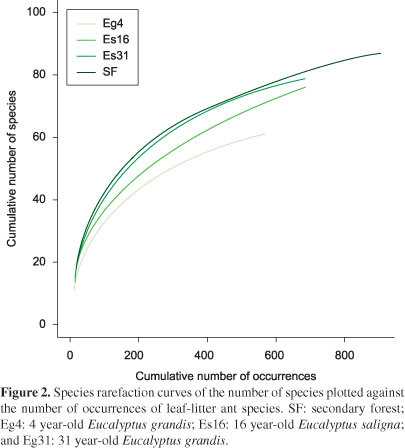Secondary forests and exotic tree plantations are expanding across tropical landscapes. However, our current understanding of the value of these human-dominated forest landscapes for invertebrate biodiversity conservation is still very poor. In this paper, we use the leaf-litter ant fauna to assess invertebrate diversity in one commercially managed Eucalyptus plantation (four years old), two abandoned plantations of different regeneration ages (16 and 31 years), and one neighboring secondary Atlantic Forest in Southeastern Brazil. There was a clear gradient in species richness from the secondary forest to the managed Eucalyptus plantation; richness and diversity peaked in secondary forest and in the older regenerating Eucalyptus plantation. Significantly more species were recorded in secondary forest samples than in Eucalyptus plantations, but Eucalyptus plantations had a similar level of richness. Furthermore, a non-metric multidimensional scaling analysis revealed clear differences in species composition between the younger managed Eucalyptus plantation (understory absent) and habitats with sub-developed or developed understory. Eucalyptus plantations were characterized by an assemblage of widespread, generalist species very different from those known to occur in core forest habitats of southeastern Brazil. Our results indicate that while older regenerating Eucalyptus plantations can provide habitat to facilitate the persistence of generalist ant species, it is unlikely to conserve most of the primary forest species, such as specialized predators, Dacetini predators, and nomadic species.
Formicidae; habitat modification; eucalipt plantations; diversity



